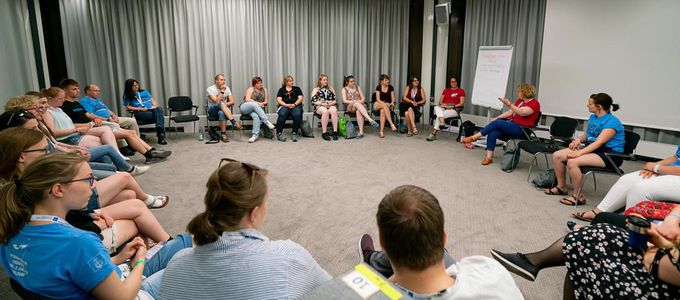Impulses from the IYC – Help! My husband is a minister

How can I be a good example in faith for my children, if there is no time to look after my own soul? What can I do when my work-life-church-balance is out of balance? There were some answers at the IYC 2019.
Two women, wives of ministers, investigated these questions in a discussion group, hoping to come up with a good approach. Christina Bartels and Jana Weyh led two discussion groups during the International Youth Convention in Düsseldorf (Germany). Many women made use of the offer, some together with their husbands.
Ministry is something that concerns the entire family
As different as their life situations may have been, the women did agree on one point: God knows whom He brings together. Often women bring strengths and other aspects into a relationship that can help the men in fulfilling their ministerial tasks better. Conversely, it is not only men who benefit from a ministry, because the blessing has an effect on the entire family. A participant in the discussion pointed out: “What do we envisage as blessing? The Hebrew word for blessing is barak and means to be endowed with a healing power.” In order for this blessing to become effective, the woman and children must be enabled to participate.
Open communication is the be-all and end-all
Some of the participants had fathers who were ministers and who are still struggling with the high expectations that pressed down on the family. Christina Bartels encouraged them: “When you reach your limits, be sure to talk about it.” There is no master plan for a successful relationship, she said, but having the courage to honestly communicate with your partner is hugely beneficial. Passive aggressive quips like, “Well, you’re home early!” only aggravate the situation. The happiness of spending time together, the struggle to find a compromise that works for both, and open discussions are good ingredients to create a healthy balance.
When it comes to family time, Christina Bartels and Jana Weyh put quality before quantity. A participant said that her own daughter was so happy with the family situation as a child that she was convinced: “When I grow up, I am going to marry a Priest.”
The Father’s house is our delight
Even so, sometimes we may feel that the church is more burden than anything else. The participants talked about practical tips on how one can preserve one’s joy in the Lord or breathe new life into it. A family schedule that is regularly discussed together, for example, can help with organising the week. Task sharing in the family is also possible in many instances, as the wife of a rector explains: “My husband conducts the service almost every Sunday. So every second Wednesday I go to church while he stays home with the children. That way the other ministers don’t get out of practice, and I can regularly attend divine services and absorb the word without any distractions.” Committed ministers often tend to take on every task that arises in the congregation. But if the members and the families of the ministers all pull together, then one could make temporary concessions: “Even if there are no flowers on the altar for a change, we still take the blessing home with us from the divine service.”
Ideas for the future
“It would be nice if there were a large forum that is accessible to any woman who wishes. Not everyone has sisters in her congregation with whom she can share her worries,” Jana Weyh says. The positive feedback from the participants confirmed that such an exchange can bear fruit. One young woman said goodbye with the words: “Thank you, you have taken away my fear of the future.”
Photo: Jona Ruthardt




